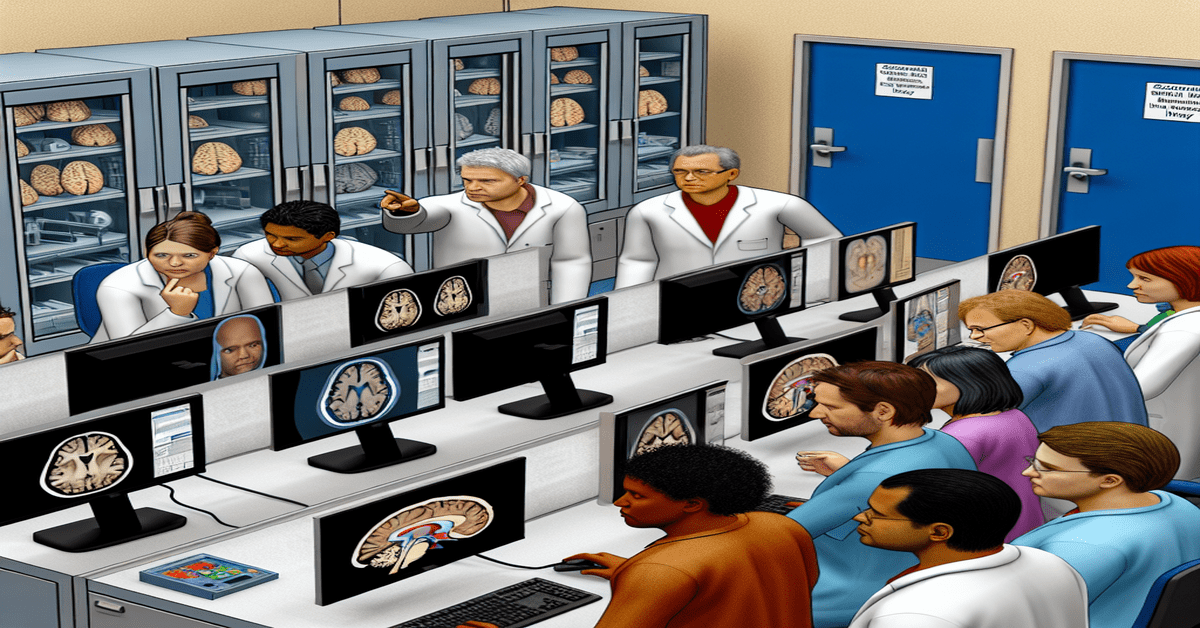AI-Powered Brain Scan Analysis: A Groundbreaking Approach to Predicting Dementia Risk
In a remarkable development, researchers are harnessing the power of artificial intelligence (AI) to analyze an astounding 1.6 million brain scans, with the goal of creating tools that can predict an individual’s risk of developing dementia. This groundbreaking project, aptly named Scottish AI in Neuroimaging to predict Dementia and Neurodegenerative Disease (SCAN-DAN), brings together a multidisciplinary team of 20 scientists and clinical researchers from the esteemed Universities of Edinburgh and Dundee.
Identifying Patterns to Predict Dementia
The SCAN-DAN team is on a mission to uncover patterns within brain scans that can serve as indicators of an individual’s likelihood of developing dementia. By leveraging the vast dataset of 1.6 million scans, the researchers aim to train AI algorithms to recognize subtle changes and abnormalities that may be precursors to this debilitating condition.
This ambitious endeavor is part of a larger global research collaboration known as NEURii, which seeks to improve the quality of life for individuals living with dementia. NEURii provides funding and expertise to “pathfinder projects” like SCAN-DAN, enabling researchers to push the boundaries of what is possible in the field of dementia research.
Unlocking Insights from Scottish Population Data
The data utilized in the SCAN-DAN project is truly comprehensive, encompassing CT and MRI scans of the entire Scottish population from 2008 to 2018. To ensure the utmost security and privacy, this invaluable dataset will be stored in the Scottish National Safe Haven, a secure environment designed for sensitive medical data.
By employing cutting-edge AI and machine learning techniques, the researchers will delve into the imaging data, correlating it with associated health records such as demographics and treatment histories. This holistic approach aims to paint a detailed picture of the factors that may contribute to the development of dementia.
Empowering Radiologists and Enabling Early Diagnosis
Professor Will Whiteley, the project’s co-leader, emphasizes the significance of utilizing simple brain scans to predict dementia. By harnessing the power of AI, radiologists could be equipped with tools to identify patients at high risk of developing the condition. This early detection could pave the way for earlier diagnoses and more targeted treatments, potentially improving outcomes for countless individuals.
Professor Emanuele Trucco, another key figure in the project, highlights the value of this new dataset for neurological research as a whole. Beyond its immediate application in dementia prediction, the insights gained from SCAN-DAN could lead to the development of software tools that integrate seamlessly with routine radiology operations. These tools could assist in clinical decision-making and serve as an early warning system, flagging potential dementia risks and enabling proactive interventions.
A Collaborative Effort Towards a Brighter Future
The SCAN-DAN project represents a shining example of the power of collaboration in the face of complex medical challenges. By bringing together brilliant minds from different disciplines and leveraging the latest technological advancements, researchers are taking significant strides towards unraveling the mysteries of dementia.
As the project progresses, it holds the promise of not only improving our understanding of this devastating condition but also providing healthcare professionals with the tools they need to make a real difference in the lives of those affected by dementia.
Join the Conversation
We invite you to share your thoughts and experiences related to dementia research and the potential impact of AI in this field. Have you or a loved one been affected by dementia? What are your hopes for the future of dementia diagnosis and treatment? Leave a comment below and let’s engage in a meaningful discussion about this critical topic.
Together, we can raise awareness, support ongoing research efforts, and work towards a future where dementia can be predicted, prevented, and effectively treated. Let’s unite in our mission to improve the lives of those affected by this condition and create a brighter tomorrow for all.
#DementiaResearch #AIinHealthcare #BrainScans
-> Original article and inspiration provided by WION
-> Connect with one of our AI Strategists today at Opahl Technologies


